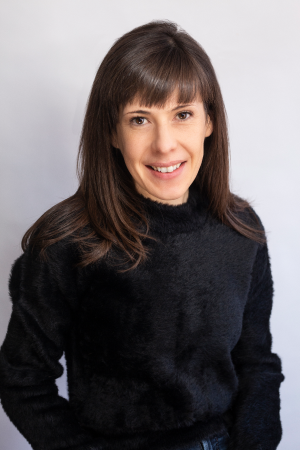
Madeline Hayes
Biography
Dr. Madeline Hayes grew up in Calgary, Alberta and Markham, Ontario and completed her PhD in the Department of Molecular Genetics at the University of Toronto under the mentorship of Dr. Brian Ciruna, focusing on developmental signaling pathways involved in vertebrate axis formation. Here, Hayes discovered a passion for developmental biology, genetics and modeling human disease using zebrafish. She pursued postdoctoral training at the Massachusetts General Hospital in Boston, in the laboratory of Dr. David Langenau, where she focused on paediatric cancer biology and honing her skills in zebrafish cancer modeling, human tissue culture, zebrafish xenograft, and mouse xenograft transplantation techniques. In 2019, Hayes returned to The Hospital for Sick Children (SickKids) and under the mentorship of Drs. Meredith Irwin, David Kaplan, and Bret Pearson developed multiple precision zebrafish models of high-risk human cancer subtypes, with the goal of better understanding patient-specific tumor cell biology and testing targeted drug compounds in vivo.
Research
The Hayes Lab incorporates developmental biology and cancer signaling, zebrafish modeling, human tissue culture, and xenograft transplantation approaches to better understand underlying biology related to aggressive paediatric solid tumors including neuroblastoma and sarcomas. The lab aims to leverage complementary model systems for the discovery of novel genetic mechanisms and effective therapeutic targets for translation to the clinic.
Achievements
- 2023–2026: V Foundation V Scholar
- 2018–2020: Canadian Institutes of Health Research Postdoctoral Fellowship Award
- 2018–2019: Simeon J. Fortin Charitable Foundation Fellowship Award
- 2016–2019: Alex’s Lemonade Stand Young Investigator Award
- 2016–2018: Amanda Riley (Bear Necessities) Research Fellowship Award
Publications
- A syngeneic spontaneous zebrafish model of tp53-deficient, EGFRviii, and PI3KCAH1047R-driven glioblastoma reveals inhibitory roles for inflammation during tumor initiation and relapse in-vivo. Weiss A, D’Amata C, Pearson BJ, Hayes MN. Elife. (2024) Jul 25;13:RP93077.
- SHP2 inhibition with TNO155 increases efficacy and overcomes resistance of ALK inhibitors in neuroblastoma. Valencia-Sama I, Kee L, Christopher G, Ohh M, Layehifard M, Shlien A, Hayes MN*, Irwin MS*. Cancer Research Communications. (2023) 3(12):2608-2622.
- Single-cell analysis and functional characterization ucover the stem cell hierarchies and developmental origins of rhabdomyosarcoma. Wei Y, Qin Q, Yan C, Hayes MN, Xi H, Garcia S, Do D, Jin A, Eng T, Spentzos D, Neilsen P, Wexler L, Pyle AD, Suva M, Dela Cruz F, Pinello L, Langenau DM. Nature Cancer. (2022) 3(8):961-975.
- tp53 deficiency causes a wide tumour spectrum and elevates embryonal rhabdomyosarcoma metastasis in zebrafish. Hayes MN*, Ignatius MS*, Moore FE, Tang Q, Garcia SP, Blackburn PR, Baxi K, Wang L, Jin A, Ramakrishnan A, Reeder S, Chen Y, Nielsen GP, Chen EY, Hasserjian RP, Ekker SC, Langenau DM. Elife. (2018) 7:e37202. *co-first author.
- Vangl2/RhoA Signaling Pathway Regulates Stem Cell Self-Renewal Programs and Growth in Rhabdomyosarcoma. Hayes MN, McCarthy K, Jin A, Oliveira ML, Iyer S, Garcia SP, Sindiri S, Gryder B, Motala Z, Nielsen GP, Borg JP, van de Rijn M, Malkin D, Khan J, Ignatius MS, Langenau DM. Cell Stem Cell. (2018) Mar 1;22(3):414-427.

